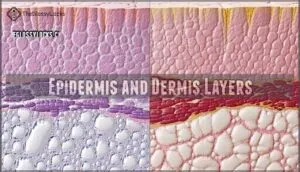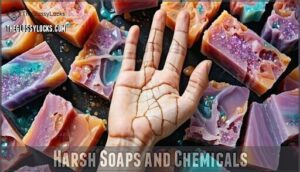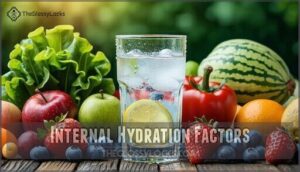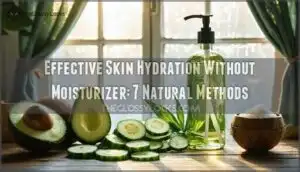This site is supported by our readers. We may earn a commission, at no cost to you, if you purchase through links.

Well-hydrated skin appears plump, smooth, and radiant because water helps transport nutrients to skin cells while flushing out toxins. Dehydrated skin, however, becomes dull, flaky, and more prone to premature aging.
The importance of skin hydration extends beyond aesthetics—it affects your skin’s ability to heal, regulate temperature, and defend against bacteria. Without adequate moisture, your skin can’t perform these essential functions effectively, leading to sensitivity and compromised protection.
The right hydration strategy involves both internal and external approaches that work together seamlessly to maintain proper hydration levels and support your skin’s natural functions.
Table Of Contents
- Key Takeaways
- Skin Structure Basics
- Causes of Dehydrated Skin
- Skin Hydration Strategies
- Internal Hydration Factors
- Environmental Impacts on Skin
- Frequently Asked Questions (FAQs)
- Why is hydration important?
- Why is hydration important for skin health & appearance?
- What is skin hydration?
- How does hydration Improve Your complexion?
- How to keep your skin hydrated?
- Why is topical hydration important?
- Why is hydration so important for skin?
- What happens when you don’t hydrate your skin?
- Why is it important for the skin to maintain moisture?
- Why is hydration important for skin integrity?
- Conclusion
Key Takeaways
- You’ll see immediate results when you hydrate both internally and externally – drinking 6-8 glasses of water daily, while applying moisturizer within minutes after showering, creates the most effective hydration strategy
- Your skin’s protective barrier depends on consistent moisture to function properly – without adequate hydration, you’ll experience increased sensitivity, premature aging, and compromised protection against environmental damage
- Environmental factors constantly steal moisture from your skin – cold weather, hot showers, harsh soaps, and low humidity levels strip away natural oils, making protective measures essential
- Proper hydration affects your skin’s ability to heal and regenerate – well-hydrated skin maintains elasticity, supports cellular renewal, and appears plump and radiant, while dehydrated skin becomes dull and prone to irritation
Skin Structure Basics
Your skin isn’t just a simple covering—it’s a complex system that works around the clock to protect you from the outside world.
Understanding how your epidermis, dermis, and hypodermis function together helps explain why proper hydration is so critical for maintaining healthy, resilient skin.
Epidermis and Dermis Layers
Your skin’s two outer layers work together like a dynamic duo.
The epidermis acts as your body’s first line of defense, continuously shedding cells while maintaining vital skin barrier function.
Meanwhile, the dermis provides the structural foundation with these essential components:
- Dermal Strength – collagen fibers that keep skin firm
- Skin Flexibility – elastin that allows stretching and bouncing back
- Receptor Housing – nerve endings for touch and pain sensation.
This layer interaction guarantees ideal epidermal function and skin hydration retention.
Hypodermis and Subcutaneous Tissue
The hypodermis, also known as subcutaneous tissue, sits beneath your dermis as the deepest skin layer.
This fatty layer serves multiple functions: fat storage for energy reserve, body temperature regulation, and shock absorption from physical impacts.
Rich in connective tissue and blood vessels, it connects your skin to underlying muscles and bones while maintaining skin moisture through its insulating properties.
Skin Cell Shedding and Melanocytes
Your epidermis works like a dedicated renovator, constantly shedding old skin cells while melanocytes produce pigment for skin color and sun protection.
This cell turnover process takes about 28 days, rejuvenating your skin barrier function and maintaining healthy skin hydration.
Proper shedding keeps your skin smooth and radiant.
To further enhance this process, consider chemical peels for renewal for renewal.
Causes of Dehydrated Skin
Your skin faces daily challenges that can drain its moisture and leave it feeling tight and uncomfortable.
Your skin fights an uphill battle against moisture-stealing forces every single day.
Understanding what causes dehydration helps you protect your skin‘s natural barrier and maintain a healthy, radiant complexion.
Cold and Heat Exposure
When extreme temperatures assault your skin, hydration levels plummet faster than you’d expect.
Cold, dry weather reduces your skin’s barrier function, while heat accelerates moisture loss through increased sweating.
These environmental factors create a perfect storm for dehydration.
Seasonal skin changes demand weather protection strategies, including humidifier use indoors and sunscreen application outdoors to maintain ideal skin hydration despite temperature impact, and utilizing a humidifier.
Harsh Soaps and Chemicals
Beyond temperature extremes, the products you use daily can wreak havoc on your skin’s natural defenses.
Many conventional cleansers contain harsh chemicals that strip away your skin’s protective barrier, leaving it vulnerable and dehydrated.
Common culprits that damage your skin include:
- Sulfates – aggressive detergents that create excessive foam but remove natural oils
- Alcohol-based products – quickly evaporate moisture while causing irritation and dryness
- Fragrances and dyes – chemical irritants that trigger inflammation and sensitivity reactions
- Antibacterial agents – disrupt your skin’s beneficial microbiome and natural balance
- Alkaline soaps – alter your skin’s pH, weakening its ability to retain moisture.
Reading product labels becomes your first line of defense against barrier damage.
Choose gentle cleansers with mild soap ingredients that cleanse without stripping.
Cold weather exposure can also exacerbate these effects.
Your skin will thank you for making this simple switch.
Insufficient Water Intake
Your body’s like a garden that needs regular watering – skip the H2O, and your skin shows it first.
Poor water intake habits directly impact skin hydration, leaving you with dehydrated skin causes that are entirely preventable.
When hydration monitoring becomes an afterthought, skin dryness creeps in.
Water intake levels matter more as we age, and hydration and exercise demands increase your skin moisture needs substantially.
Medical Conditions and Dryness
While drinking enough water helps, certain medical conditions can leave your skin feeling like sandpaper no matter how much you moisturize.
Thyroid disease slows your metabolism, reducing natural oil production and leaving skin dry and flaky. Menopause effects include hormonal changes that decrease skin’s ability to retain moisture. Diabetes impact on skin hydration occurs through increased water loss and poor circulation.
One such condition, hypothyroidism causes skin changes, often leading to dryness and coarseness.
Eczema hydration: This chronic condition creates patches of inflamed, itchy skin that struggles to maintain its protective barrier
- Psoriasis moisture: Scaly, red patches develop when skin cells multiply too quickly, creating thick, dry areas
- Dermatological conditions: Kidney disease and other systemic issues can disrupt your body’s fluid balance, affecting skin health
Skin Hydration Strategies
You can take control of your skin’s hydration with the right strategies and products. The key is timing your moisturizer application and choosing ingredients that work with your skin type.
Moisturizer Application Timing
When should you apply moisturizer for maximum benefits?
Post-shower application works best—lock in moisture within minutes of bathing while your skin’s still damp.
Nighttime moisturizing allows deeper absorption during sleep’s natural repair cycle.
Frequency matters too; daily application maintains your skin hydration routine.
Seasonal adjustments help combat weather changes that affect product absorption and your skin care routine‘s effectiveness.
To maximize the benefits, consider the timing and frequency of application.
Hydrating Ingredients and Humidifiers
Look for skincare products containing hyaluronic acid and ceramides—these hydrating ingredients work like tiny sponges, drawing moisture into your skin.
Hyaluronic acid holds up to 1,000 times its weight in water, while ceramide benefits include strengthening your skin barrier.
Consider also how omega-3 supports hydration and reduces inflammation.
Adding a humidifier to your bedroom maintains ideal humidity levels around 30-50%, helping your skin retain moisture naturally with the use of ceramides and humidifier to support skin hydration.
Limiting Hot Showers and Baths
While hot showers feel luxurious, they’re your skin’s worst enemy.
High Water Temperature strips away natural oils that maintain skin barrier function, leaving you tight and flaky.
Keep Shower Temperature lukewarm and limit Bath Duration to 10 minutes max.
After bathing, pat dry gently—rubbing damages delicate skin.
Follow up with Hydration Aftercare by applying moisturizer within three minutes to lock in remaining skin moisture, focusing on proper skin barrier function.
Choosing Skincare Products
Beyond temperature control, selecting the right skincare products makes all the difference.
You’ll want to match products to your skin type—oily skin needs lightweight, water-based formulas while dry skin requires rich, moisturizing skincare with hydrating ingredients.
Knowing your skin type is essential, and you can use a skin type quiz to determine the best products.
- Product texture matters: Gels absorb quickly for oily skin; creams provide deeper hydration for dry skin
- Check ingredients: Look for hyaluronic acid and ceramides in the best moisturizers for superior results
- Budget considerations: Effective skin hydration products don’t always require premium pricing—focus on proven ingredients over fancy packaging
Internal Hydration Factors
While topical moisturizers work wonders for your skin’s surface, what you drink and eat plays an equally important role in maintaining that healthy glow from within.
Your skin’s hydration depends on a steady supply of water and nutrients that can only come from proper internal nourishment.
Drinking Water and Skin Hydration
Your body’s water intake directly impacts skin hydration and texture.
Drinking plenty of water helps your skin maintain its natural moisture balance from within. This internal hydration can be just as effective as topical moisturizers.
Water supports your skin’s ability to flush toxins while rejuvenating skin cells.
Proper hydration improves skin texture and keeps your complexion looking healthy and radiant.
Consuming water-rich foods can also hydrate skin cells directly, which aids in overall internal hydration.
Diuretic Drinks and Skin Dehydration
While drinking water supports skin hydration, certain beverages can work against your efforts.
Alcohols Impact includes dehydrating effects that reduce skin moisture levels. Caffeine Effects from coffee and tea also act as diuretics, pulling water from your system.
These drinks disrupt your Hydration Balance, potentially leaving your skin looking dull and compromising Skin Elasticity.
Consider Diuretic Alternatives like herbal teas to maintain peak skin health.
Essential Fatty Acids and Skin Health
Three essential fatty acids transform your skin’s health by strengthening the lipid barrier and boosting skin hydration.
Omega-3 fatty acids reduce inflammation while supporting skin elasticity and collagen production.
You’ll find these EFA food sources in salmon, walnuts, and flaxseed oil, which provide omega-3 benefits for lipid barrier repair and lasting moisture retention.
Recommended Daily Water Intake
Adults need about 6-8 cups of water daily for ideal skin hydration.
Men should target 13 cups, women 9 cups of total fluids.
This water intake benefits your skin by supporting elasticity and helping rejuvenate skin texture.
Proper hydration aids toxin flush while replacing what’s lost through sweat, maintaining healthy skin water balance.
Environmental Impacts on Skin
Your skin faces constant challenges from the environment around you, from freezing winter air to blazing summer heat.
These external factors can quickly strip away your skin’s natural moisture and leave you looking like a raisin that’s seen better days.
Cold and Dry Weather Effects
Winter skin faces a tough battle against harsh environmental factors.
Cold temperatures and low humidity levels work together to strip moisture from your skin barrier, leaving it tight and irritated.
Your body’s natural defenses weaken when exposed to freezing air, making dry skin conditions worse and requiring extra protection through moisturizers and climate control adjustments to maintain a healthy skin barrier.
Humidifier Benefits and Optimal Humidity
Everyone knows that dry air can wreak havoc on your skin hydration, but humidifiers offer a simple solution.
These devices maintain ideal humidity levels between 40-60%, creating an environment where your skin can thrive and retain moisture naturally.
Many seek specific humidifier models for this purpose.
- Humidifier Types include cool mist, warm mist, and ultrasonic models for different preferences
- Humidity Levels should stay between 40-60% to prevent both dryness and excessive moisture
- Dry Air from heating systems strips natural oils, causing tightness and irritation
- Sinus Relief occurs alongside improved skin hydration when using humidifiers consistently
- Skin Suppleness increases as environmental factors support your skin’s natural moisture barrier
Sunscreen and Protective Clothing
Your skin faces constant assault from UV rays, making sunscreen your best defense against premature aging and dryness.
Choose broad-spectrum SPF 30+ and reapply every two hours for maximum skin protection.
Protective clothing like wide-brimmed hats and long sleeves creates an additional barrier.
This dual approach maintains skin hydration while preventing sun damage that accelerates moisture loss.
Using sunscreen for skin is a key step in skin protection.
Adjusting Home Climate Control Settings
Your home’s climate control systems directly impact your skin’s health through humidity levels and temperature control.
Set your thermostat between 68-72°F and maintain 30-50% humidity using built-in humidifiers or standalone units.
Regular system maintenance guarantees superior air quality while preventing dry conditions that strip moisture from your skin environment, making your airconditioning and furnace work together for better skin hydration, which is crucial for skin hydration.
Frequently Asked Questions (FAQs)
Why is hydration important?
Imagine this: without proper hydration, your skin’s natural barrier crumbles like ancient parchment.
You’ll develop wrinkles, irritation, and dullness faster than expected.
Hydration keeps your skin cells plump, maintains elasticity, and protects against environmental damage and premature aging, which is crucial for maintaining healthy and youthful-looking skin, with hydration being the key factor.
Why is hydration important for skin health & appearance?
Hydration keeps your skin cells plump and functioning properly, maintaining elasticity and preventing fine lines. Well-hydrated skin appears smooth, supple, and youthful while protecting against environmental damage and irritation effectively.
What is skin hydration?
Water content within your skin cells determines how plump, elastic, and healthy your skin looks and feels. It’s different from surface moisture but equally essential for barrier function.
How does hydration Improve Your complexion?
When you’re properly hydrated, your skin cells plump up, reducing fine lines and wrinkles.
You’ll notice a natural glow as hydration supports cellular renewal and helps maintain your skin’s protective barrier for smoother texture, with hydration being key to this process.
How to keep your skin hydrated?
Like a car needs regular refueling, your skin requires consistent hydration to function properly.
Apply moisturizer within minutes after showering, drink 6-8 glasses of water daily, use a humidifier, and limit hot showers to maintain ideal skin moisture levels.
Why is topical hydration important?
Topical moisturizers create a protective barrier that prevents water loss, maintains skin elasticity, and strengthens your skin’s natural defense against environmental damage and irritants.
Why is hydration so important for skin?
Your skin needs hydration to maintain its barrier function, cellular health, and elasticity. Without adequate moisture, you’ll experience dullness, irritation, premature aging, and compromised protection against environmental damage.
What happens when you don’t hydrate your skin?
An ounce of prevention is worth a pound of cure" rings true for skin care.
When you don’t hydrate your skin, it becomes dull, tight, and prone to irritation, fine lines, and premature aging as your protective barrier weakens.
Why is it important for the skin to maintain moisture?
Moisture acts as your skin’s protective shield, preventing water loss and maintaining elasticity. Without proper moisture, your skin becomes vulnerable to irritation, premature aging, and environmental damage.
Why is hydration important for skin integrity?
Like those old-timey medicine shows promised, proper hydration keeps your skin’s barrier strong and resilient.
When you’re well-hydrated, your skin cells function properly, maintain elasticity, and effectively protect against irritants and environmental damage, which helps keep your skin resilient.
Conclusion
Consider Sarah, a 28-year-old office worker who ignored her skin’s hydration needs until fine lines appeared around her eyes.
You can prevent similar issues by maintaining consistent hydration habits. The importance of skin hydration extends beyond appearance—it’s fundamental to your skin’s protective barrier, healing ability, and overall health.
Remember that effective hydration combines internal water intake with external moisturizing products. Start implementing these strategies today to maintain healthy, resilient skin throughout your life, with a focus on healthy skin.
- https://qima-lifesciences.com/cosmetic-claims/hydration-skin-barrier/
- https://www.parkview.com/blog/the-importance-of-proper-skin-hydration
- https://pmc.ncbi.nlm.nih.gov/articles/PMC4529263/
- https://pubmed.ncbi.nlm.nih.gov/35681001/
- https://forefrontdermatology.com/the-hydration-connection-how-water-intake-impacts-skin-health/













